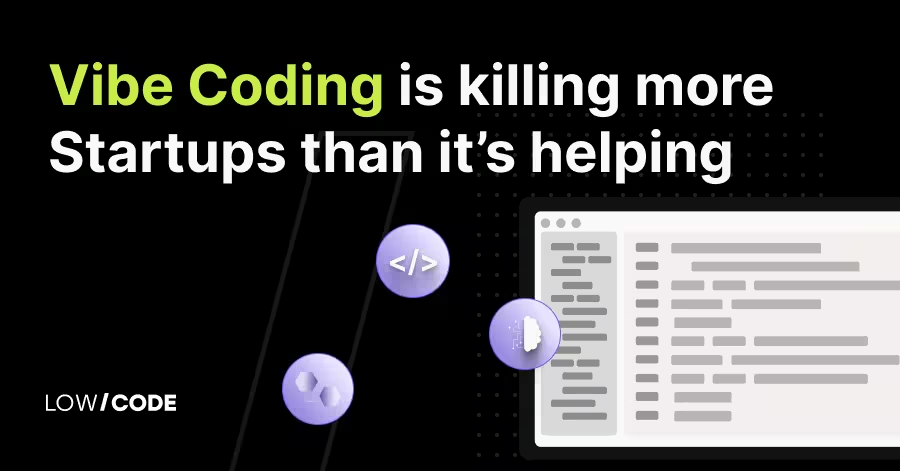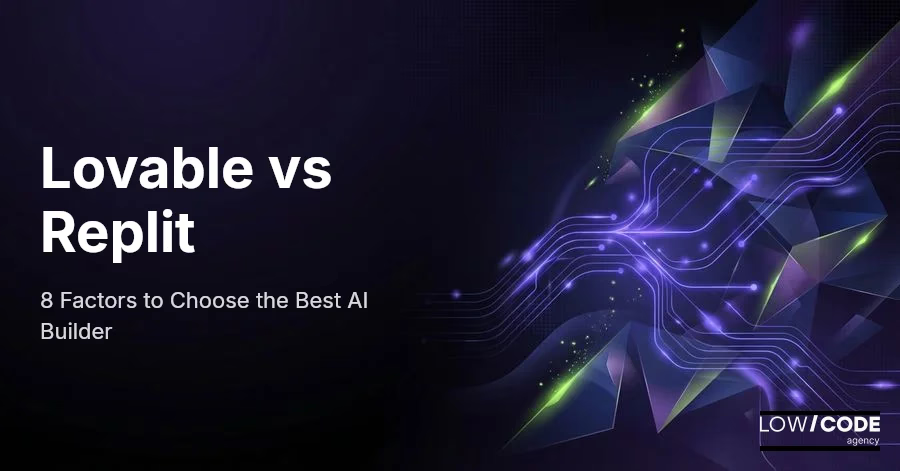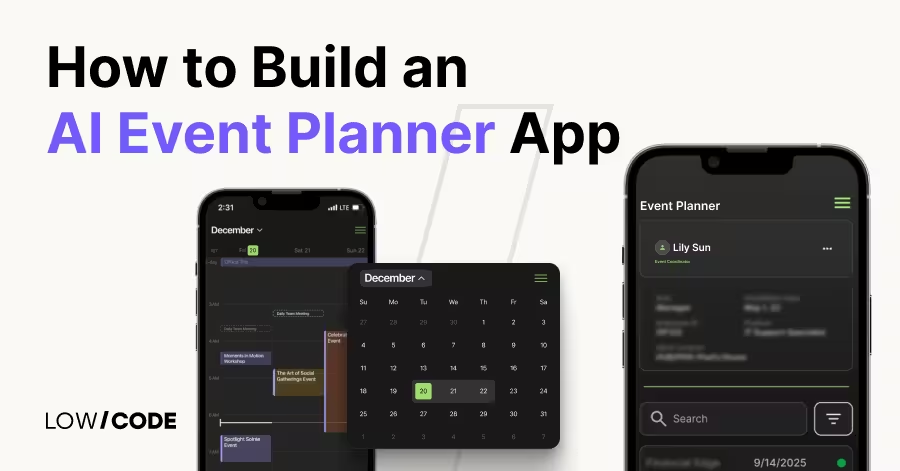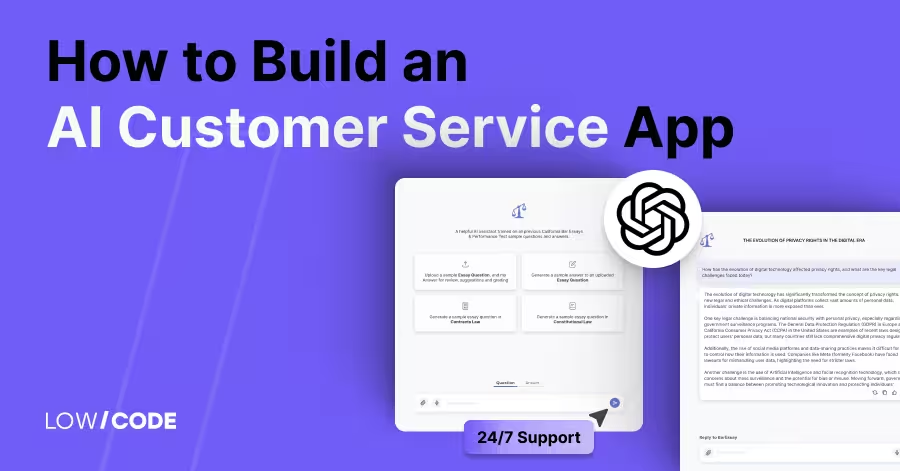How to Hire AI App Developers
17 min
read
Want to hire AI app developers fast and within budget? This guide shows you how to find the right talent and avoid common mistakes

AI app development has moved from cutting-edge to essential as businesses race to integrate intelligent features into their products. Yet finding developers who truly understand both artificial intelligence and practical application development remains challenging.
You're not just looking for developers, you need partners who can translate complex AI capabilities into user-friendly, valuable experiences for your customers.
Whether you're building a recommendation engine, implementing natural language processing, or creating predictive analytics features, the right AI app developer can mean the difference between a revolutionary product and a resource-draining disappointment.
This guide will walk you through identifying your AI development needs, evaluating potential developers, and making hiring decisions that align with your business goals. We'll cover what to look for, red flags to avoid, and how to structure your engagement for the best results.
Hire LowCode Agency to Build Your AI-Driven App
At LowCode Agency, we've built over 330 apps including dozens of AI-powered solutions for startups and businesses looking to innovate without the traditional development headaches.
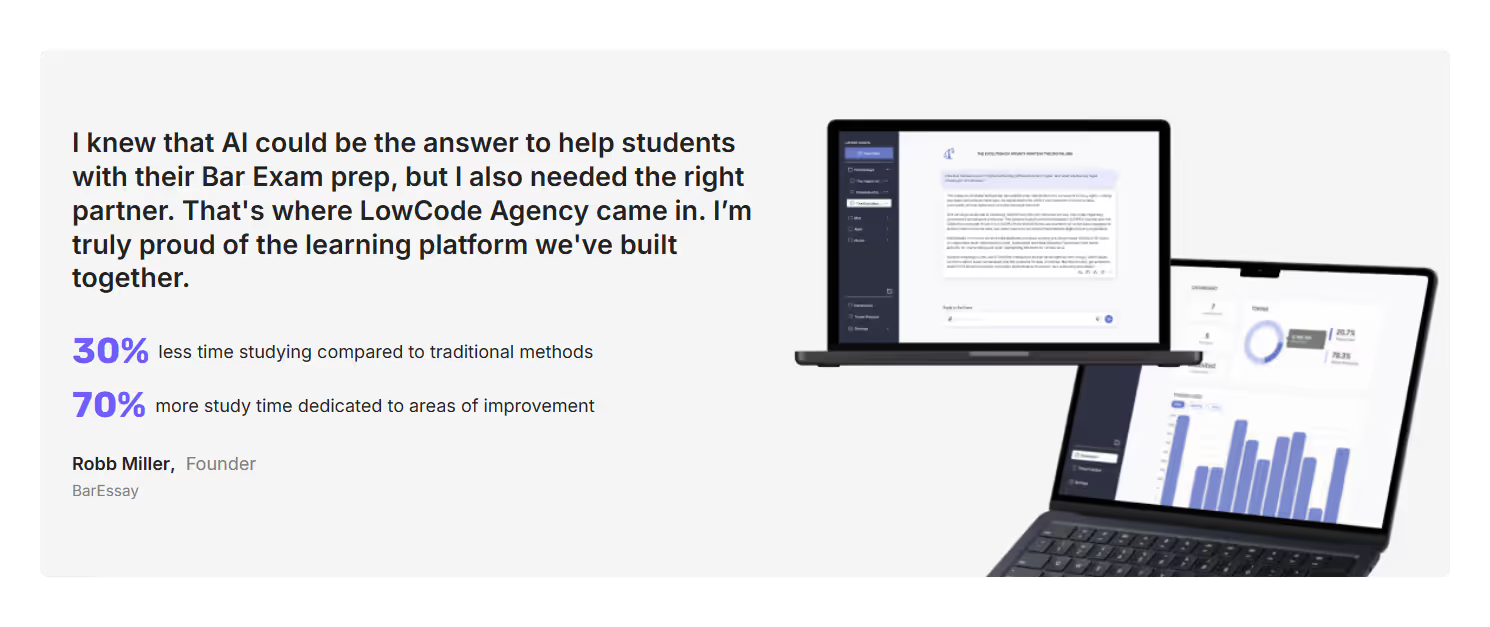
We're a team of strategic experts who focus on more than just developing apps: we partner with you throughout the entire journey, from the first call. Unlike freelancers who might deliver and disappear, we stay by your side from concept to launch and beyond.
Our collaborative approach means you'll work with dedicated professionals who understand both the technical challenges of AI integration and the business outcomes you need to achieve.
Ready to transform your business with AI? Book a discovery call today, and let's discuss how we can turn your AI app concept into reality within weeks, not months.
Understanding the Role of AI App Developers
What Do AI App Developers Do?
AI app developers create applications that boost artificial intelligence to deliver smarter user experiences and automate complex processes. These specialists bridge the gap between advanced AI capabilities and practical, user-friendly applications.
Using platforms like Bubble, FlutterFlow, and Glide, today's AI app developers can integrate powerful features without writing thousands of lines of code. They build smart features directly into your applications through:
- Conversational interfaces and AI chatbots that understand user intent.
- Smart automation workflows that eliminate repetitive tasks.
- Recommendation engines that personalize user experiences.
- Predictive analytics that forecast trends and behaviors.
- Computer vision features that can analyze images and video.
The best AI app developers don't just implement these features; they strategically apply them to solve real business problems and create meaningful user experiences.
Read more | 9 Best Generative AI Development Companies
Types of AI App Developers
- Traditional AI Developers specialize in programming languages like Python and frameworks such as TensorFlow or PyTorch. They build custom AI models from scratch, which offers maximum flexibility but requires significant time, expertise, and resources.
- Machine Learning Engineers focus specifically on creating and optimizing machine learning algorithms and models. They're data-focused specialists who tune AI systems for accuracy and performance but may have less experience with user-facing application development.
- No-code AI App Builders take a different approach by leveraging pre-built AI services and no-code platforms to rapidly create functional applications. They excel at integrating services like OpenAI, Microsoft Azure AI, or Google Cloud AI into user-friendly interfaces without extensive coding.
Each type brings unique strengths to AI projects, with no-code builders offering the fastest path from concept to working application.
No-code vs Traditional Development
When building AI-powered applications, the development approach you choose significantly impacts timeline, budget, and outcomes:
Traditional AI development involves:
- Custom-built solutions requiring specialized programming skills.
- Development cycles spanning 6-12 months or longer.
- Higher costs due to specialized talent requirements.
- Complex maintenance requiring ongoing developer support.
No-code AI development offers:
- Development timelines are measured in weeks rather than months.
- Cost reductions of 60-80% compared to traditional methods.
- The ability to update and iterate without developer dependency.
- Rapid integration of new AI services as they become available.
No-code platforms have matured significantly, now offering enterprise-grade security, scalability, and performance. By leveraging these tools, developers can focus on strategic implementation rather than technical details.
For most businesses, no-code AI development delivers the ideal balance of customization, speed, and cost-efficiency, especially when working with specialists who understand how to maximize these platforms' capabilities.
Benefits of Hiring Professional AI App Developers
1. Expertise in AI Tools and Workflows
Professional AI app developers bring specialized knowledge of current AI capabilities and limitations. They understand which tools best suit specific business challenges and how to implement them effectively.
This expertise helps you avoid common pitfalls like overengineering solutions or implementing AI where it doesn't add value. The right developers will guide you toward practical applications that deliver tangible business results.
2. Faster Development and Iteration
Experienced AI app developers significantly accelerate your time-to-market through streamlined workflows and efficient implementation approaches.
They've already solved similar challenges and can apply proven patterns to your project, eliminating the trial-and-error process that slows down inexperienced teams. This speed allows you to validate your AI solution with users sooner and iterate based on real feedback.
3. Integration with Modern APIs (like OpenAI, Claude)
Professional developers stay current with the rapidly evolving ecosystem of AI services and APIs from providers like OpenAI, Anthropic (Claude), and cloud platforms.
They know how to properly implement these services, manage rate limits and costs, and create fallback mechanisms for reliability. This expertise saves you from costly integration issues and ensures your app leverages the best available AI capabilities.
4. Scalable and Maintainable Architecture
Expert AI app developers build with growth in mind, creating architectures that can scale as your user base expands. They implement proper data handling protocols, performance optimization techniques, and flexible components that accommodate changing requirements.
This forward-thinking approach prevents the need for painful rewrites later and ensures your app can evolve alongside advancing AI technologies.
5. Post-Launch Support and Improvements
The launch of your AI app is just the beginning. Professional developers provide ongoing monitoring, maintenance, and enhancement services to keep your application running smoothly.
They help you analyze user data to identify improvement opportunities, implement new features based on feedback, and keep your AI components updated as new capabilities become available. This continuous support maximizes your app's long-term success and return on investment.
Where to Find AI App Developers
1. Specialized Development Agencies
Working with specialized agencies like LowCode Agency offers the most comprehensive solution for AI app development. These agencies bring together teams of experts who collaborate on different aspects of your project.
Specialized AI app development agencies provide:
- Strategic guidance from professionals who've built similar applications.
- Consistent quality with established development processes and quality assurance.
- Effective project management ensures that your development stays on track.
- Access to diverse skill sets, including design, development, and AI integration.
- Ongoing support and maintenance after your app launches.
These agencies have already solved the hiring challenge by assembling teams of vetted experts who work together regularly. This established workflow leads to more predictable timelines and higher-quality outcomes compared to assembling individual freelancers.
For complex projects or business-critical applications, specialized agencies represent the lowest-risk path to successful implementation.
2. Freelance Platforms
Freelance marketplaces offer access to individual AI app developers with varying specializations and skill levels:
- Upwork hosts thousands of developers with a wide range of experience and rate levels, but quality varies dramatically.
- Fiverr provides quick access to affordable talent for smaller projects, though deep expertise may be limited.
- Toptal claims to offer the "top 3%" of talent with a rigorous vetting process, but at premium rates.
While these platforms may seem cost-effective initially, they come with significant drawbacks:
- The burden of vetting candidates falls entirely on you.
- Freelancers often juggle multiple clients, leading to availability challenges.
- Project management responsibilities remain with your team.
- Long-term support can be uncertain if the freelancer becomes unavailable.
- Complex projects may require multiple freelancers who haven't worked together before.
Freelance platforms work best for smaller, well-defined projects where you already have experience managing development work.
3. Tech Communities and Forums
Specialized technology communities can be valuable sources for finding AI app developers with platform-specific expertise:
- Bubble Experts Directory connects you with developers experienced in the Bubble no-code platform.
- Glide Experts Directory features developers specialized in building data-driven apps.
- FlutterFlow Experts Directory offers access to developers who build mobile apps with AI features.
These communities often provide more targeted expertise than general freelance platforms. Developers found through these channels typically have demonstrable experience with the specific tools you're using.
However, this approach requires:
- More time invested in searching and evaluating potential developers and agencies.
- Direct management of the vetting and hiring process.
- Handling contract negotiations and project management yourself when hiring single developers.
Factors to Consider When Hiring AI App Developers
1. Technical Skills and Proficiency
When evaluating AI app developers, look beyond general development skills to their specific expertise with AI technologies and implementation methods:
- AI Service Knowledge: Assess their familiarity with major AI services like OpenAI, Claude, Google Cloud AI, or Microsoft Azure AI. Experienced developers should understand the capabilities, limitations, and pricing models of these platforms.
- No-code Platform Expertise: For faster development, verify their proficiency with platforms like Bubble, Glide, or FlutterFlow. Ask about their certification status and how long they've worked with each platform.
- Integration Experience: Examine their ability to connect different systems and data sources. Strong AI app developers can seamlessly integrate AI capabilities with existing databases, authentication systems, and third-party services.
- Data Handling Skills: Effective AI applications depend on proper data management. Ensure developers understand data preprocessing, user data protection, and efficient data storage practices.
- Problem-Solving Approach: Ask candidates to describe how they'd implement specific AI features in your app. Their answers will reveal both technical knowledge and practical thinking.
2. Portfolio and Past Projects
A developer's previous work provides valuable insights into their capabilities and approach:
- Relevance to Your Project: Look for examples similar to your planned application. While exact matches are rare, check for projects using comparable technologies or solving similar problems.
- Quality Assessment: When reviewing portfolio projects:
- Test the applications yourself if possible.
- Evaluate the user experience and interface design.
- Check for responsive design and cross-platform compatibility.
- Assess the intelligence and usefulness of AI features.
- Project Complexity: Determine whether their previous work demonstrates the level of sophistication your application requires. Simple chatbots differ significantly from complex AI systems with multiple integrated features.
- Evolution of Work: A developer's portfolio should show growth and adaptation to new technologies over time, indicating they stay current with AI advancements.
3. Client Testimonials and Reviews
Feedback from previous clients offers perspective on what it's like to work with the developer:
- Communication Patterns: Look for mentions of clear, consistent communication in testimonials. This indicates the developer keeps clients informed throughout the project.
- Problem Resolution: Pay attention to how developers handled challenges or changing requirements. The best partners navigate obstacles professionally and find effective solutions.
- Timeline Adherence: Check whether reviews mention on-time delivery or delays. Consistent timeliness suggests reliable project management.
- Support Quality: Reviews often highlight post-launch support quality, which is crucial for AI applications that require ongoing maintenance and updates.
- Verification Process: When possible, ask to speak directly with past clients to get unfiltered feedback about their experience.
4. Communication and Collaboration
Effective development partnerships depend on strong communication practices:
- Responsiveness: Evaluate how quickly and thoroughly developers respond during your initial interactions. This often predicts their communication style throughout the project.
- Progress Reporting: Ask about their process for keeping clients updated. Look for structured approaches like weekly demos, status reports, or project management tools.
- Expectation Setting: Good developers clearly communicate what they need from you and what you can expect from them at each project stage.
- Collaboration Tools: Confirm which tools they use for project management, design reviews, and feedback collection. Their systems should integrate smoothly with your team's workflow.
- Transparency: Developers should be forthcoming about challenges, limitations, and potential issues rather than hiding problems until they become crises.
5. Understanding of Your Industry
Domain knowledge significantly impacts the quality of AI implementation:
- Relevant Experience: Developers with experience in your industry will understand its unique requirements, compliance considerations, and user expectations.
- Learning Capacity: If developers lack specific industry experience, assess their ability to quickly learn about your domain. Ask how they've adapted to new industries in past projects.
- Business Perspective: The best AI app developers think beyond technical implementation to consider how features will impact your business goals and user behavior.
- Compliance Awareness: Verify that developers understand any regulations affecting your industry, particularly for healthcare, finance, or applications handling sensitive user data.
- Terminology Familiarity: Developers who understand your industry's language will communicate more effectively and translate business requirements into appropriate technical solutions.
By thoroughly evaluating these factors, you'll identify AI app developers who can not only build your application but also contribute strategically to its success.
Cost Considerations in Hiring AI App Developers
Understanding the financial aspects of AI app development will help you budget appropriately and evaluate proposals more effectively. Several key factors influence the cost of building AI-driven applications:
- Project Complexity: Simple applications with basic AI features like a customer support chatbot or content categorization typically range from $20,000-$30,000. More sophisticated applications with multiple AI components, custom training, or complex workflows generally fall between $25,000-$55,000. Enterprise-level systems with advanced AI capabilities, extensive integrations, and high security requirements can exceed $75,000.
- Extent of AI Implementation: The depth of AI integration significantly impacts development costs. Using pre-built AI services with minimal customization keeps costs lower, while applications requiring custom machine learning model development demand substantially higher investment. Additionally, consider ongoing costs for AI service usage, which typically follow consumption-based pricing models.
- Platform Selection: Your choice of development platform creates meaningful cost differences. Traditional custom-coded AI applications typically cost 2-4 times more than equivalent no-code solutions. No-code platforms like Bubble or Glide reduce development expenses by eliminating much of the engineering work while still delivering professional results.
- Third-Party Integrations: Each additional integration with external systems adds complexity and cost. Simple connections to standard APIs might add $1,000-$3,000 to your project. More complex integrations with legacy systems or specialized services can add $5,000-$15,000 each. Always prioritize integrations that deliver clear business value.
- Ongoing Maintenance and Improvements: Budget for post-launch expenses including AI service usage fees based on transaction volume, platform subscription costs, regular updates and refinements an, user feedback implementation and feature enhancements.
- Developer Selection: Developer rates vary significantly. While agencies may have higher hourly rates than freelancers, their efficiency and expertise often deliver better value through faster development, higher quality, and more strategic implementation. Unlike freelancers who might abandon your project for more lucrative opportunities, agencies provide continuity and commitment, ensuring your project is never left incomplete or without support.
For most small to mid-sized businesses, a comprehensive AI-powered application built on no-code platforms by experienced developers typically ranges from $20,000-$30,000.
When evaluating proposals, look beyond the bottom-line figure to understand what's included. The cheapest option rarely delivers the best return on investment for AI applications where quality and performance directly impact business outcomes.
Steps to Hire the Right AI App Developer
1. Define Your App's AI Use Case and Goals
Before approaching developers, clearly identify how AI will add value to your application. Outline specific problems you want AI to solve and the outcomes you expect to achieve. Create use cases that describe user interactions with AI features and define measurable success criteria for each capability.
This preparation helps developers accurately assess feasibility, suggest appropriate approaches, and provide meaningful cost estimates. The more specific your requirements, the more accurate your project planning will be.
2. Choose the Right No-code Platform
Select a development platform that aligns with your project requirements, timeline, and budget. For data-heavy applications with simple interfaces, Glide might be ideal. For complex web applications with sophisticated workflows, Bubble often works best. If mobile experiences are essential, FlutterFlow provides native app capabilities.
Your platform choice significantly impacts development speed, costs, and the pool of qualified developers available. Many developers specialize in specific platforms, so this decision narrows your search effectively.
3. Evaluate Portfolios and Book a Discovery Call
Review potential developers' past work, focusing on projects similar to yours in complexity, functionality, or industry. Pay special attention to their AI implementations: how intuitive, responsive, and useful are they? Then schedule discovery calls with your top candidates.
During these calls, assess both technical expertise and communication style. Strong candidates will ask insightful questions about your business goals, suggest appropriate AI approaches, and explain complex concepts clearly. They should challenge assumptions constructively and offer strategic input, not just take orders.
4. Align on Scope, Timeline, and Budget
Work with your chosen developer to create a detailed project specification that outlines features, functionalities, and deliverables. Define clear milestones with associated payments to ensure alignment throughout the project. Discuss potential challenges and contingency plans for handling unexpected complications.
Be wary of developers who promise unrealistically short timelines or unusually low costs, as AI implementation often involves unique challenges that require expertise and time to solve properly. The most successful projects start with realistic expectations on all sides.
5. Start Collaboration and Maintain Clear Communication
Establish communication protocols and review schedules before development begins. Determine how progress will be demonstrated and feedback incorporated. Set expectations for availability on both sides to prevent delays.
Throughout development, prioritize transparency and promptness in your communications. Provide timely feedback on demonstrations and be available to answer questions about your requirements. The best AI applications emerge from collaborative processes where business expertise and technical knowledge work in harmony.
Remember that hiring a developer is just the beginning of your relationship. The most successful AI applications evolve over time based on user feedback and emerging AI capabilities, so consider long-term partnership potential when making your selection.
Common Challenges in Hiring AI App Developers
1. Miscommunication and Scope Misalignment
Perhaps the most prevalent issue in AI app development is the gap between expectations and delivered outcomes. AI terminology can be misinterpreted, leading to confusion about what's technically feasible. For example, a client might request "AI that thinks like a human," while developers understand this as implementing specific machine learning algorithms with defined limitations.
To avoid this challenge, create detailed specifications with examples, use cases, and acceptance criteria. Establish a glossary of terms to ensure shared understanding. Regular demos throughout development help catch misalignments early before they become expensive to correct.
2. Managing Time Zone Differences
Working with developers across different time zones can complicate collaboration and extend development timelines. Questions that could be resolved in minutes might take a full day when teams operate on opposite schedules. This delay compounds with each iteration and feedback cycle.
Mitigate this challenge by establishing overlapping working hours for key discussions, using asynchronous communication tools effectively, and planning for longer feedback cycles in your project timeline. The best partnerships find a rhythm that accommodates geography without sacrificing productivity.
3. Ensuring Build Quality and AI Performance
AI applications require specialized quality assurance that goes beyond traditional testing. Many businesses struggle to effectively evaluate AI components that may exhibit probabilistic rather than deterministic behavior. Poor implementation can result in AI features that work inconsistently or fail to deliver meaningful value.
Protect yourself by establishing clear acceptance criteria for AI features, including performance metrics and error tolerances. Request testing reports that demonstrate how the AI performs across various scenarios. Consider incremental releases that allow for real-world validation before full deployment.
4. Lack of Post-Launch Support from Developers
AI applications aren't "set and forget" solutions, they require ongoing maintenance and optimization. Many businesses face challenges when developers complete the initial build but aren't available for critical updates or when AI services evolve. This is particularly problematic with freelancers who may move on to other projects.
Address this challenge by discussing post-launch support requirements early in the hiring process. Establish service level agreements for response times and ongoing maintenance. Consider retainer arrangements that ensure priority access to your developer's time when needed, especially during the critical period immediately following launch.
Conclusion
Finding the right AI app developer is a critical investment that shapes not just your application's features, but its overall success and impact on your business. The rapidly evolving AI landscape demands partners who combine technical expertise with strategic thinking and reliable execution.
Ready to turn your AI app concept into reality? Book a free discovery call today to discuss your project needs- The right AI app developer is more than a technical resource; they're a partner in your business success. Choose wisely, and you'll create applications that truly transform how you serve your customers and operate your business.
Created on
June 23, 2025
. Last updated on
January 7, 2026
.

FAQs
What skills should I look for in an AI app developer?
How much does it cost to hire an AI app developer?
Where can I find trusted AI app developers?
Is it better to hire a freelancer or an agency for AI app development?
How do I evaluate an AI developer's experience and portfolio?
What should I include in my project brief before hiring an AI developer?





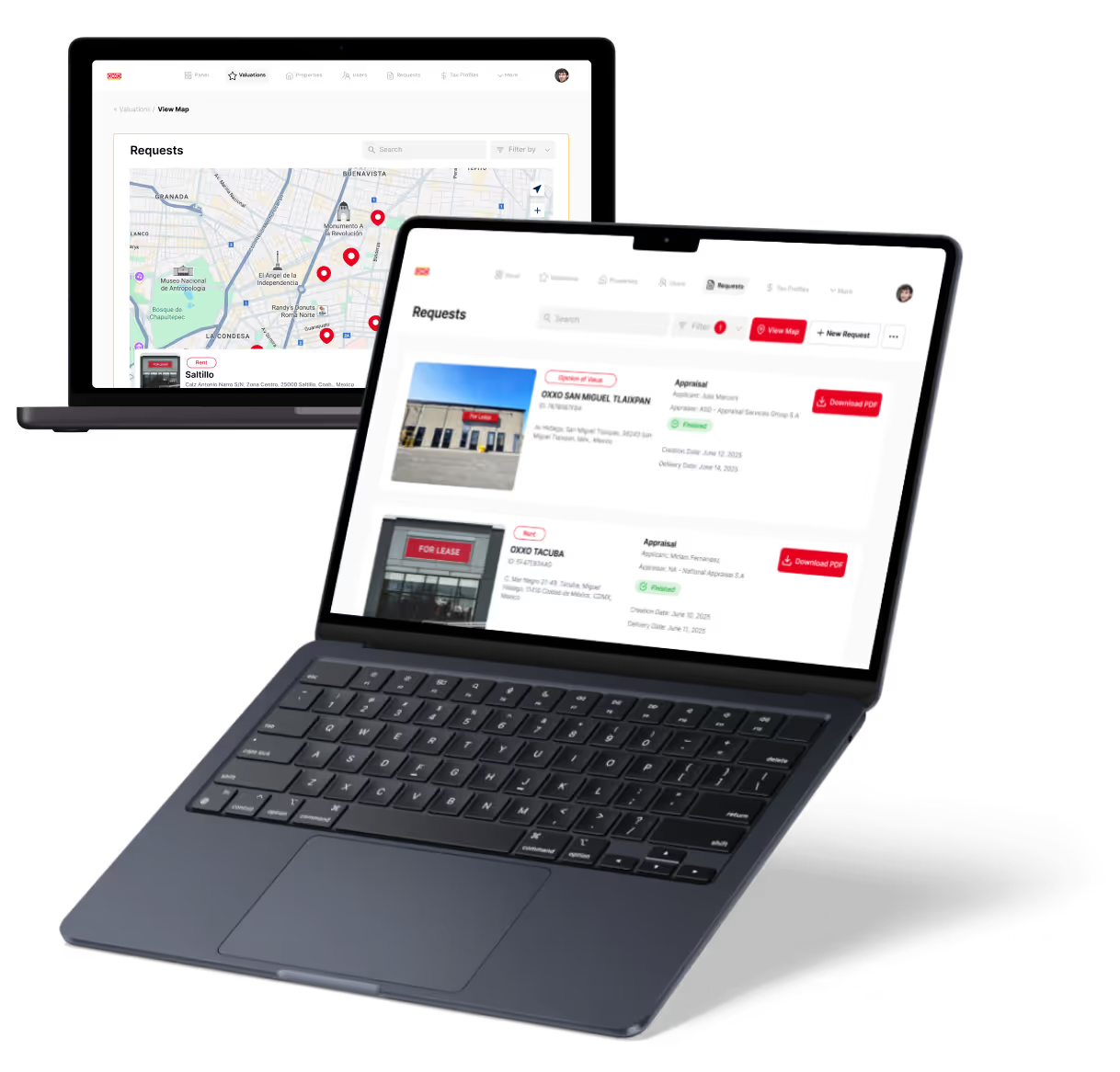

%20(Custom).avif)



